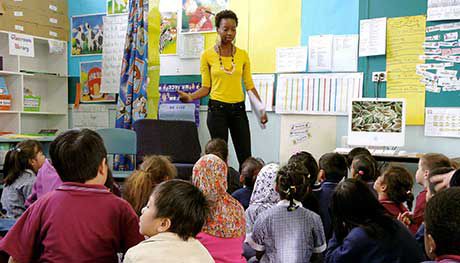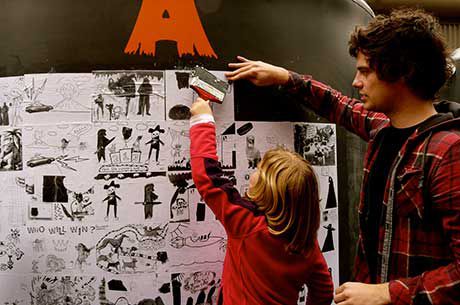Can you tell us a little about 100 Story Building? How did the project begin?
100 Story Building provides opportunities for the most marginalised children and young people in the inner west of Melbourne to develop the literacy skills, confidence and sense of belonging that are fundamental to their future success. We connect these young writers with professionals from across the literary world in collaborative projects, publishing the work they produce, and giving them a space to share their creative voice.
We have been working in this area for nearly four years now, under the name Pigeons Projects, ever since co-founder Jenna Williams and I undertook internships at 826 Valencia, a writing and tutoring centre in San Francisco established by Dave Eggers. In this work with young writers and their teachers, it became pretty clear that a space outside of school, where students can engage with a wider community of creative and passionate people, young and old, would be of huge benefit.
With the help of a number of funders, pro bono partners, an incredible board, and long-term volunteer-turned 100 Story Building co-founder and Communications Manager Jess Tran, we are now establishing a space where we will run our free programs for the children and young people of the west, as well as offering products and services that help support our work. These include 100 Story Studios – monthly masterclasses on writing for children and young adults, delivered by some incredible authors such as Alice Pung and Michael Pryor, and our publisher partner Hardie Grant Egmont.

Who are some of the authors and publishers involved?
We are constantly amazed at the level of generosity displayed by folks in the publishing world. We have had a huge number of authors, illustrators, comic creators, poets and storytellers contribute their time, passion and expertise, including Sally Rippin, Terry Denton, Shaun Tan, Alice Pung, Michael Pryor, Tony Wilson, Andrew McDonald, Bernard Caleo, Sherryl Clarke. We wish we could name them all. We have also received support from a number of publishers, including Hardie Grant Egmont, Penguin, Black Inc. and Text.
What type of programs will you be running when the centre opens next year?
Thanks to the generous support of the St George Foundation, we will be producing the second edition of early harvest, a literary journal that is created entirely by children. The program involves an editorial committee of upper primary school children conceptualising, editing and publishing a high-quality literary magazine, with the guidance of industry professionals and a team of volunteers. It is awesome fun.
We will also be running daily workshops for schools, which are focused on collaborative writing and tend to feature an explosion of ideas. And we will continue to work with schools to develop programs that are aimed at helping them to open up the doors of the classroom and engage with the wider creative community.

What are some of your favourite moments in your work on this project so far?
So many moments! But to narrow it down, I really get a kick out the moments of empowerment, when the authentic nature of the work the children are doing becomes really apparent.
One such occasion happened towards the end of early harvest, when the young editors were reviewing the stories that had been submitted for publication. As a group they had chosen to seek submissions from adult authors as well as kids. It was a blind submission process, and the editorial board didn’t know which stories were written by adults and which were by kids. A couple of well-known adult authors received very polite rejection letters. And they took it very well, which just goes to demonstrate again the seemingly endless generosity and grace of the wonderful authors who support us!
Other favourite moments are during our book launches. To see a child reading the story they have spent six months working on, in front of a crowd of their school, friends and family, the story in a book that has just been plucked from a box straight from the printers, is a pretty special thing to experience. The pride and sense of achievement in that child is something that can’t be given to them by anyone other than themselves, and they know it. That is a powerful realisation for a child, particularly if the world they live in throws up a daily onslaught of challenges and barriers.
How can the public get involved or support 100 Story Building?
We would not survive without our volunteers, and as we get towards establishing the centre, there will be plenty of opportunities for passionate and enthusiastic people to contribute their time and energy.
Our workshops, both at the centre and in school, will rely on one-on-one tutors, and there will also be opportunities to facilitate, present and even be involved in the development of the programs. As well as these roles, we are keen to hear from people who think they may have other skills to contribute. Designers, editors and proofreaders will be crucial to helping us publish our books of writing by young people. And there are many other ways to get involved - come along to our launch this Tuesday to hear more about our volunteering opportunities.
100 Story Building will be launched at the Wheeler Centre this Tuesday 30 October at 7.30pm.


